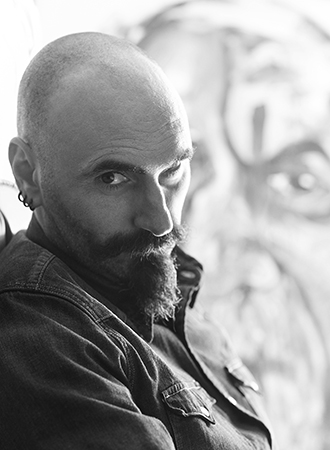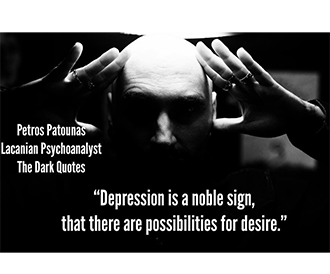The being is not an emblematic tautology whispering that the being is being: that it is antecedented by the sophist or the polemicist whose most private member has been replaced by a pansophy, not much of a different organ, when, still, the object of copulation is the woman to be reduced to a rib taken from a man∙ the being is a cause, when the Das Ding be-comes a Das Being, a command of desire to Be a cause, be-cause the signifier is repressed but not the Letter: this is the enumerating prayer that is not numeric and not a Noumenon by which one knows how to use the Real.
Not, not the Act of speaking, neither that of the subject of speech, of the ὑποκείμενον– but from, not of, the Act who Speaks: that is not the speaking being of the been speaking, but the ErgOn whose vitality is not ornamentalised by the forename of the acting out founded on the What cannot be said nor upon that which has not been received or interpreted from the Other, but of an Acting because It is said: and, if an uninhabited dictionary entry would have been able to verbalize, or, at least to stutter its demand for a genesis of that godforsaken destitute received by the object, that would have been the definition of Saint Christopher the Dog whose being is without a theory of forms, an άσχημος, without a shape, as the intonation of the object ά moves beyond but not apart the schema, from the Entelechy to Entelexia, which marks the revelations of the Letter and the Ascesis of the psychoanalyst sourcing the transliteration of his desire∙ it is a mere flash of humor to take a huff from the Other of the Rosetta Stone and the transliteration of the hieroglyphs of a system, which is a metasis and not desire, since the letter scripting the afar of the ethics of a system’s coordination cannot assist the metousiosis of the Ascesis, one practiced with the analyst’s being, a Μεταγραφή of the proper orientation not of the treatment but of the analyst and fervently not in terms of transcription that is the way of the scribe, a servant of capitalism’s Ousia, who asserts that the ear of interpretation is dead whilst it is more alive than ever and simply he cannot interpret, implied one has the capacity of bathing within the expansion of the Apeiron, the Real of the letter and not of the signifier and of the structure, and without a second thought, of the semiotic analytic position, a death drive of no motion and a daughter of an alphabet which is of Lepsius, not towards meaning and application from one to another, be that of signifiers or of meaning, but due to its use of diacritic marks: failed, would be those who attempt to read and not dance, upon letters who are not notes and thus they are breaths, macrons of vowels indicating the way of desire and speech, eventualising the subject for the Act- that of life.
And, from the cause, derives the exigentia, not the agency but the urgency’s writing on the flesh gambling on this exigency whose ink escapes repression: the signifier is repressed but not the letter, for, it breathes encapsulating the availability of a destiny, not that of an epitaph to whose chair the psychoanalyst sits comfortably like a caliph, but one whose testicular organs have been removed just to identify with a philosopher autocrat not allowing himself to be written, never irrigating the introspective that the unconscious is timeless but not space-less, because desire, within that which is an unadulterated creation yet not a parthenogenesis, is not a hamlet nor a locus, as much as that is designated by the signifier, but a direction into the abysmal and unmethodical Aether, of the substance interweaving with the registers∙ the Aether is that which is not a number: not the agency but the Exigency of the Letter, emanating not in space and not on a body’s periphery, whose pursue is to be articulated within a material that in inhuman- and how difficult is it to bear the gymnastics of a discourse that clamors for the risorgimento of interpretation, which cannot be dead because the analyst’s voice is not taken into account, since it reduces the interventions to a “What shall happen now∙” it is not what, a So what, “What will happen now”- but a “What are you going to do”∙ for, the Aether is not the Other while the macros intervene upon those Diphthongs with a cut∙ that would have been more wise for the philosopher who cannot produce an Act for the reason that he states that there are only two Acts in psychoanalysis, what a simpleton, to name it a Laceration– the letter does not appear when the signifier is cut, but another signifier∙ and yet, because Lernaean Hydra’s head is reproduced and expands when Herculean hands axe one head, we ought to laugh with the disciple of truth, who would have known that what is been cut needs to be cauterized: that is a definite stain upon a body, ligatures that life’s discourse itself seethes on what it could have been a formation not based on Nomina Sacra, as these sacred names are letters not bent through the desire of the Subject: and those do need an Act to condense the vinculum’s sexual attraction upon the letter and meaning.
The Ethic, which is a Breath, not that poisonous commencing from Hydra’s mouth as the myth has it, does not require a Father but a drive to be driven by the source and not its object- not in a lunate proposal where the letter would be a mere representation of a signifier but through the kinesis of what the σίγμα within the scheme of a proper name’s fermentation agents is testifying at the crossroad of Arete and Kakia, where the signifier becomes a sacred letter and the subject identifies with the grammar of the master, not its discourse: both embodiments are women and the letter is beyond the Woman, for, it is not a dedication∙ and, when this latter identification occurs, there is no bar or vinculum, but the tilde who aims, not a ‘that’ aims, at the new apocatastatic use, though to deal with the same Ousia that has been ex-communicated to the function of cacophonising desire∙ for, the psychoanalyst is called to read not, not the acting out, but the circumflex in the foreshadowing of the mathematical con-text’s alleviation reducing the Letter into a number, thus transforming its utility, and, hence, resulting to what Julian the Apostate’s chirography has probed by vilipending the divination of Λόγος from the carcass, to “Recite a prayer to a corpse”∙ a transmission from the animal to the animal, and not to the human, an illness of the breath in Proteus’ motion: that is why it is said that interpretation is dead, because of the name day of that corpse who cannot interpret by transliterating the Letter to desire: Abecedarium Stasis.

